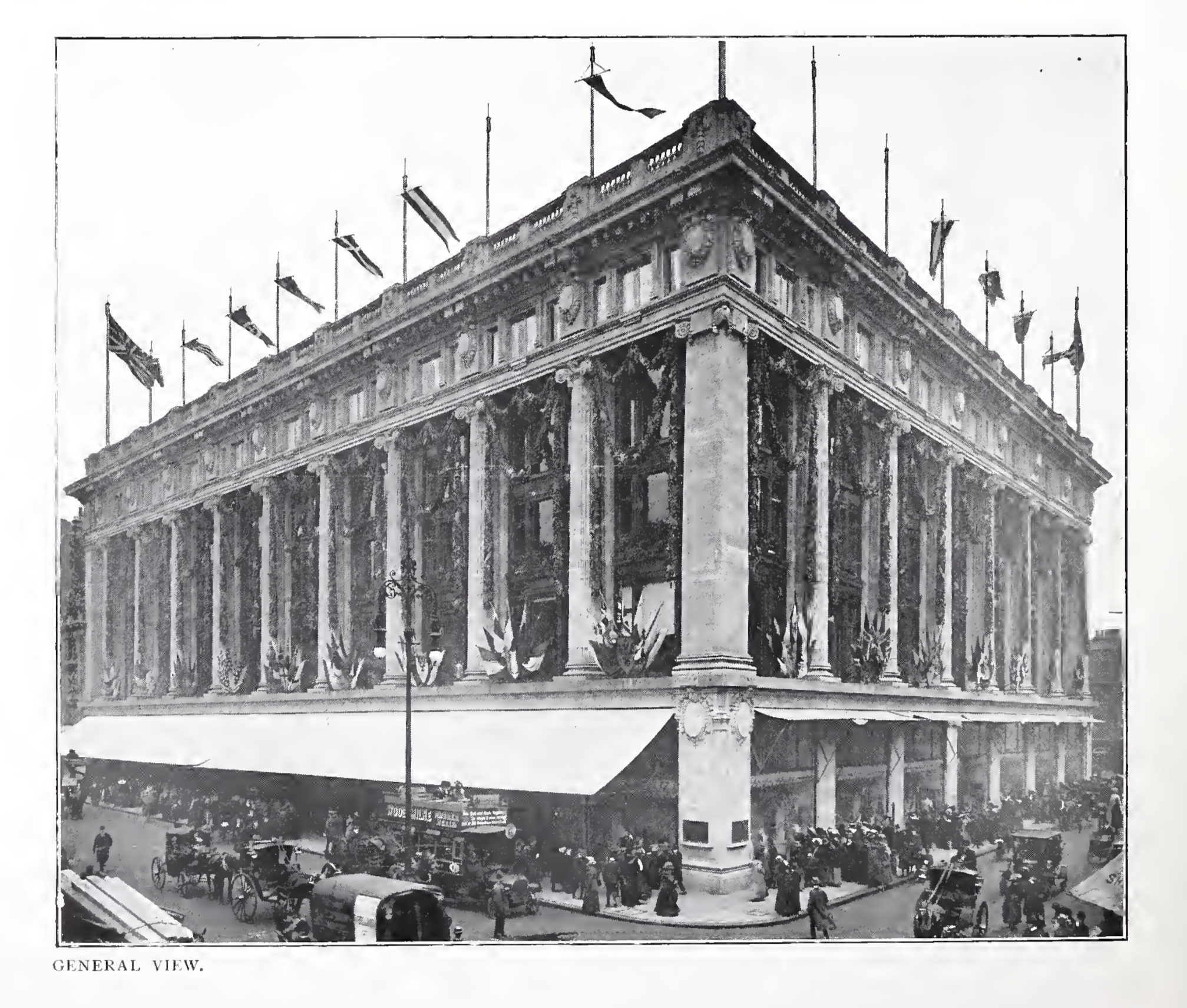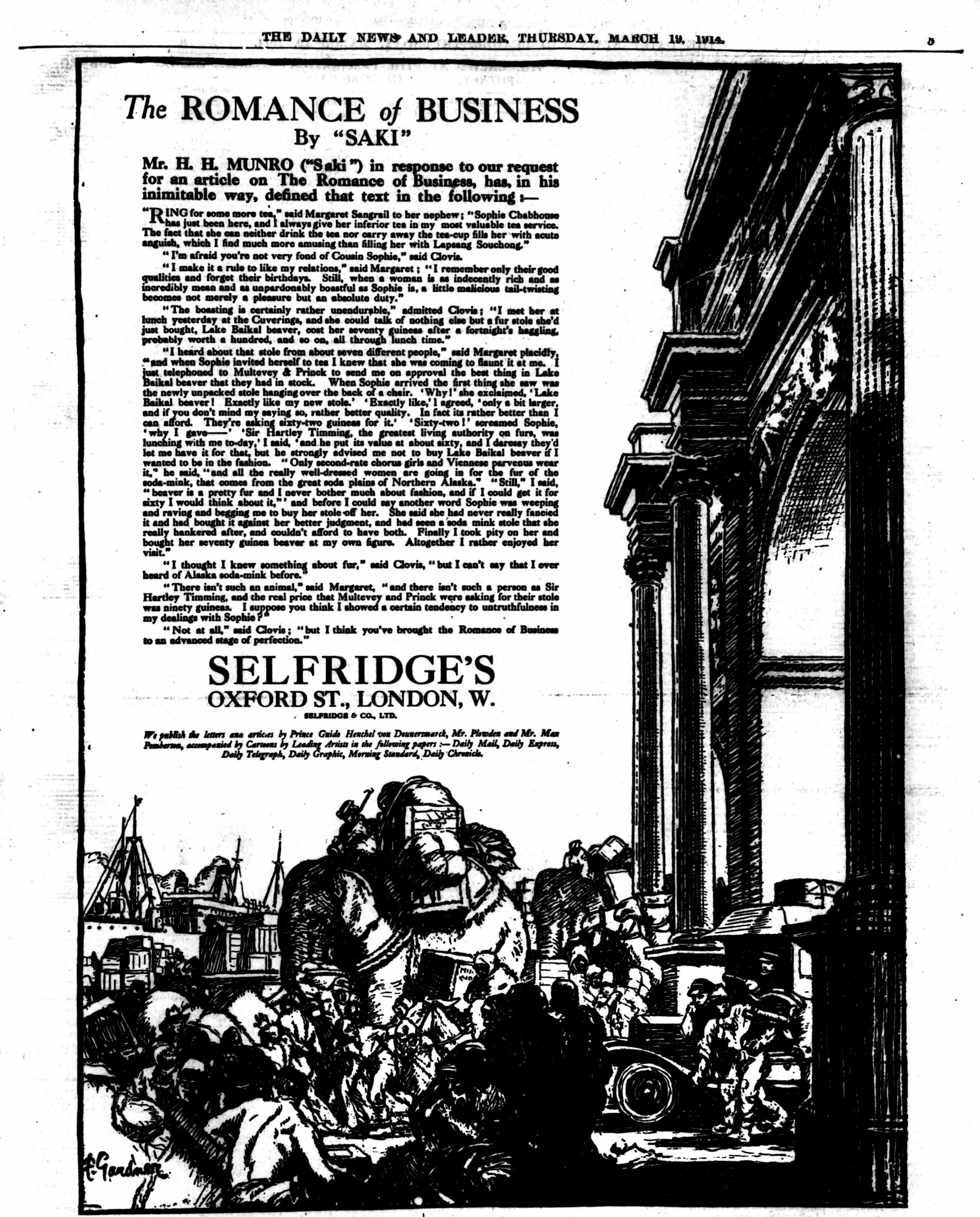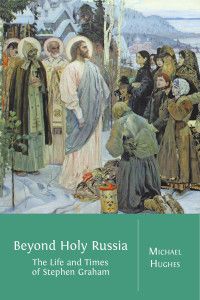Saki and Mr Selfridge
by Bruce Gaston
The closing of Fenwick’s department store on New Bond Street a couple of weeks ago adds another name to the long list of the capital’s once prominent, now defunct palaces of shopping: Debenhams, Dickins & Jones, D H Evans, Bourne & Hollingsworth, Marshall & Snelgrove, Swan & Edgar, Multevey & Princk, Walpurgis & Nettlepink, Goliath & Mastodon...

Readers, particularly those familiar with London, may by this stage be smelling a rat – surely there can’t have been a department store called “Goliath & Mastodon”? Of course there wasn't: the last three were invented by the Edwardian writer Hector Hugh Munro, better known by his pen-name ‘Saki’.
The last of them features in his story ‘Fur’: “In the near distance rose the colossal pile of Messrs. Goliath and Mastodon’s famed establishment”. It was during the Edwardian period that many department stores’ flagship buildings were built (just think of Selfridge’s on Oxford Street, or Harrod’s in Knightsbridge) and for that reason many people associate department stores with that era. The new style of shopping, with its glamour and gimmicks, intended to appeal to a female clientele, also offered potential for social satire. In ‘Louise’, the absent-minded Jane Thropplestance is unsure which store she visited earlier that afternoon. “[...] Perhaps it was Harrod’s. I really don’t remember. It was one of those places where every one [sic] is so kind and sympathetic and devoted that one almost hates to take even a reel of cotton away from such pleasant surroundings.”
I was prompted to think about Saki and department stores when I rediscovered a short text of his inside a newspaper advertisement for Selfridge’s. Munro (1870-1916) was a freelance writer specialising in short stories, and as such published his work in whichever journal or periodical would accept it. His death in the First World War meant he never had the chance to prepare a comprehensive collection of his tales in book form. If you are already a Saki fan and own one of the many “Complete Short Stories” on the market, then I have to break it to you: it isn’t complete. Over twenty forgotten stories have turned up since the 1960s. Finding them used to be a hit-and-miss affair that entailed trawling through microfilms of likely publications. But these days the task is much simpler thanks to the digitisation of newspapers so that one can run a full-text search on their contents. Certainly, I would never have thought to look in the London Daily News and Leader, as this was not one of Munro’s regular outlets.
Munro’s story is called ‘The Romance of Business’ (not to be confused with ‘Clovis on the Alleged Romance of Business’, published in The Square Egg and Other Sketches) and was commissioned as part of Selfridge’s fifth birthday celebrations in 1914.

As anyone who watched the TV series ‘Mr Selfridge’ will know, Selfridge & Co. was one of the grandest and most innovative department stores in the British Isles. It was also pioneering in terms of publicity. (The public appearance in the store of Louis Blériot, the first man to fly across the Channel, along with his monoplane, was depicted in the first series.) Munro’s text appeared within a special full-page advertisement and is surrounded by an elaborate illustration of laden men, trucks and even elephants passing through an ornate classical archway on their way to a dock with cargo ships. Selfridge’s commissioned several such illustrations from noted artists, complemented by short texts on subjects such as “The Dignity of Work”, “Imagination” and “Markets of the World”, and had them printed in a number of prominent newspapers. “It is possible that no more remarkable ads than these have been produced in the entire history of retail advertising,” gushed trade paper Dry Goods Economist. Munro, though a well-known and successful writer, was small fry compared to some of the contributors Selfridge's managed to secure. Other ads in the series contained testimonials from Prince Guido Henckel von Donnersmark (German nobility and one of the richest men in Europe to boot) and the French actress Sarah Bernhardt, whose celebrity reached around the globe.
Munro’s tale, raved the Dry Goods Economist, deals “with the great principle that all work worth doing has a broader appeal to the mind than mere mental exercise–has its spiritual side.” I wonder. While he may have been happy to pocket the Selfridge shilling, Munro’s real view was probably closer to what he put into the mouth of one of the two young ladies in ‘Fur’: “even quite good shops have their counters and windows crowded with things worth about four shillings that look as if they might be worth seven-and-six, and are priced at ten shillings and labelled seasonable gifts.” Business, Munro implies, is all about how much one pays.
You can read ‘The Romance of Business’ in the forthcoming Saki (H. H. Munro): Original and Uncollected Stories, which I have edited and annotated for OBP. OBP books, by the way, are free.
This is an Open Access title available to read and download for free or to purchase in all available print and ebook formats below.

References
‘Ad Critic’, Dry Goods Economist, v.68:3, October 3, 1914, p. 205, online at https://babel.hathitrust.org/cgi/pt?id=uiug.30112064273458&view=1up&seq=931&q1=saki
Guardian, ‘“I’m devastated it’s closing”: London shoppers say farewell to Fenwick’, 2 Feb. 2024, online at https://www.theguardian.com/business/2024/feb/02/fenwick-london-new-bond-street-department-store-close?ref=biztoc.com
Saki, ‘Fur’, in Beasts and Super-Beasts, 1914, online at https://www.gutenberg.org/ebooks/269
Saki, ‘Louise’, in The Toys of Peace and Other Papers, 1919, online at https://www.gutenberg.org/ebooks/269




